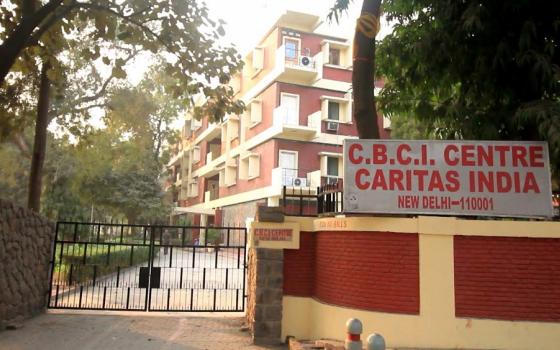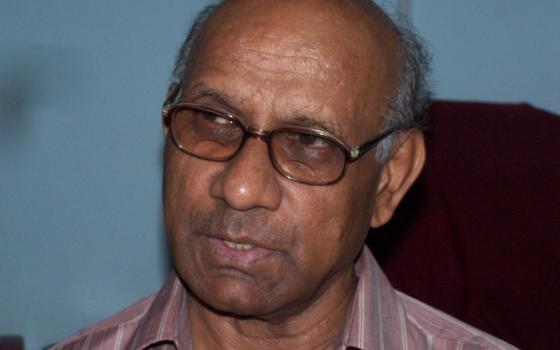Two top bodies of the Catholic church in India are now busy finalizing a policy to address sex abuse and other forms of abuse by clergy.
"A draft policy is in the final stage now. It has been circulated among all bishops and major superiors in India," says Bishop Theodore Mascarenhas, secretary general of the Catholic Bishops' Conference of India.
Mascarenhas, who in July also became spokesperson for the church in India, says the standing committee, the executive body of the bishops conference, will finalize the draft at its biannual meeting Sept. 21-23 in Bangalore, southern India.
The bishop spoke to Global Sisters Report following a June 24 story citing an increase in cases of clergy sex abuse of women religious, withholding sacraments as punishment and otherwise denying rights to nuns. The issues were detailed in a "letter of concern" that the Forum of Religious for Justice and Peace, an advocacy group for women religious, addressed to the bishops and major superiors in February. Also in February, Mascarenhas was elected secretary general of the bishops conference.
Mascarenhas says the new policy, tentatively titled "policy on sexual harassment in work places," will address all such issues systematically and comprehensively.
He clarifies that the new draft is different from the "Gender Policy of the Catholic Church of India" the conference promulgated in 2010. (The 2010 gender policy did not specifically address sexual abuse by clergy.) "This is a more structured response to the problem."
However, he declines to say more on the draft. "It is better we wait for the draft to be finalized." He says the policy will deal with abuse of women in general, not just Catholic religious women. "Sisters are also women," he says.
Besides the forum's concerns, the GSR report included insights from Catholic clergy, theologians and women religious. Emails and posted comments by sisters and their supporters soon afterward reflected approval that the clergy abuse issue was coming to light.
Archbishop Kuriakose Bharanikulangara of Faridabad told GSR that the article "was very well done" and addressed the issue comprehensively. "There is exploitation. Covering up such issues is not right. It was quite bold to bring it up," said the Syro-Malabar prelate whose diocese covers five northern Indian states.
Forum members said they were forced to write the letter as their analysis of current challenges to religious life revealed certain issues that need urgent attention by church leaders.
The forum's letter cites:
- An increase in sex abuse cases involving clergy and religious
- "Use of the sacraments by the clerics to punish the faithful, especially religious women," demanding an immediate end to such practices
- Attempts to "domesticate" religious life by giving a bishop "total control" over priests and nuns in his diocese. The letter holds that such moves violate "the very nature and role of religious life," where men and women try to exemplify "radical evangelical living" in a prophetic way.
- The need to protect and sustain the "legitimate autonomy" of religious life
The new policy draft has been prepared by the bishops conference's Office for Women in consultation with a committee comprising bishops and officials of the Conference of Religious India, the national association of major superiors of Catholic religious in the country. The committee meets every six months to address various issues related to the church and the religious.
The bishops conference comprises bishops in 171 dioceses belonging to Latin and the two Oriental Catholic ritual churches in India. The conference of religious represents more than 125,000 Catholic men and women religious in the country, the largest in Asia.
Mascarenhas stresses that it is wrong to conclude the lack of a policy thus far means that bishops are not concerned about the problem. "Bishops are concerned about anything that is affecting the church," he says.
The 55-year-old prelate wants aggrieved parties to meet church authorities personally to seek justice, instead of writing letters. "In most cases what happens is between two persons, with one accusing the other. At times it becomes very complicated as there are no witnesses."
He says there are two ways to address an issue in the church. "One is to go to the press and the other is to treat it as a justice issue and deal with it accordingly," says the prelate, who is a member of the Society of the Missionaries of Saint Francis Xavier, or Pilar Fathers, an indigenous congregation. He was made a bishop two years ago, when he returned to India after 21 years of service in the Vatican office of the Pontifical Council for Culture.
Regarding priests witholding sacraments to penalize nuns, Mascarenhas says the canon law says such priests should be excommunicated.
The new policy is the second attempt of the Indian church to address sex abuse cases, including those involving Catholic priests, women and children.
The issue of sex abuse in the church was on the agenda of the meetings between the bishops and major superiors for years, says Montfort Brother Mani Mekkunnel, who was national secretary of the Indian religious conference for nine years until 2013.
He told GSR that, during his tenure, the two groups had gathered much material, held several consultations and that a draft on some areas of agreement had reached the second stage.
"The purpose of this long and agonizing effort was the hope of reducing [all cases of abuse] by 50 percent and to do justice in some cases of violation." However, the effort was "effectively checkmated by interested parties within the church" in India, says the brother who now coordinates his congregation's education apostolate globally based in New Delhi.
The draft policy was shelved with the excuse that the Vatican had issued norms in 2010 to deal with the issue. But Mekkunnel says the Vatican norms and the Indian church's draft policy differed greatly. "The Vatican norms addressed mostly problems in the West whereas our policy was geared to deal with the local situation."
The brother says their intention was to set up some mechanism for the Indian church to deal with the overall sex abuse issue. In Geneva in 2014, Vatican officials were questioned by the U.N. for not having an effective mechanism to deal with child sexual abuse cases.
Mekkunnel says the church in India may not be able to eliminate the problem, but it can reduce the number of cases if it has a mechanism to deal with it. "Someone has to be accountable for such cases," he adds.
Their aborted policy had called for setting up an ad hoc committee to study a complaint a bishop or major superior receives. "If it finds that there is truth in the complaint, the matter will be referred to the Holy See, which will set up an official committee to go deep into the case," he explains.
The brother says most cases of clergy abuse of sisters do not involve rape. "By and large they are consensual cases that end up in quarrels," he says.
However, Sr. Manju Kulapuram, secretary of the Forum of Religious for Justice and Peace, says it is not right to dismiss clergy abuse of nuns as "consensual" cases. Nuns are not on equal terms with priests, she says, and some may have agreed to physical relationships under pressure.
Kulapuram says a clearer picture could emerge at a national consultation on the "Impact of Religion and Culture on Women's Empowerment — an Indian Perspective" to be held Sept. 23-26 in Hyderabad, India. The meeting is expected to draw women from different religious backgrounds "to raise a common voice to demand rights within religions and the state," an invitation to the program reads.
Isaac Gomes, a lay leader from Kolkata, commented on the Matters India website, where the June 24 GSR story was shared. "The good thing is that there are many brave young nuns who are not taking the hegemony of the clergy [passively] and are coming out in the open about clergy abuse of nuns in parishes, schools and social service centers where nuns work as subordinates to priests," he says.
Mekkunnel says the issue of clergy abuse is "much larger and deeper than" incidents the church addresses now and then. "I have dealt with many incidents and got frustrated in the absence of a credible process and authentic leaders. I know this is the case of many well intentioned leaders among major superiors and bishops."
The former conference of religious official welcomed the forum's efforts to keep alive the issue of clergy abuse against all odds.
"Many battles have to be fought in order to win a war," he says.
[Jose Kavi is the editor-in-chief of Matters India, a news portal focusing on religious and social issues in India. This article is part of a collaboration between GSR and Matters India.]



